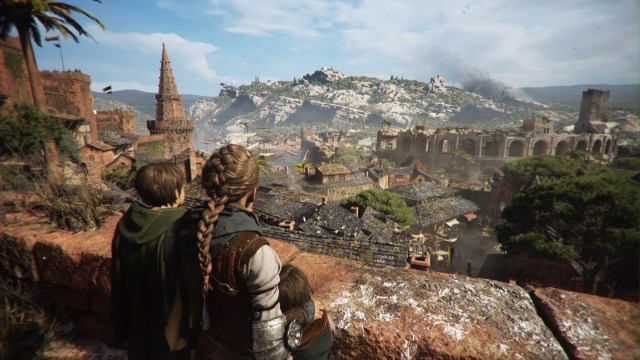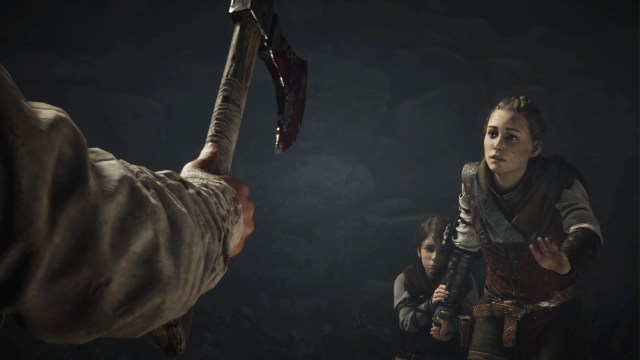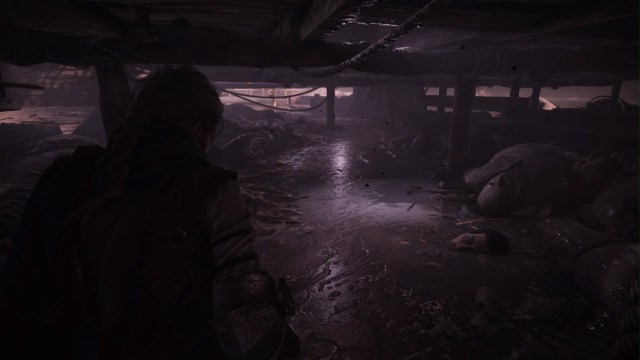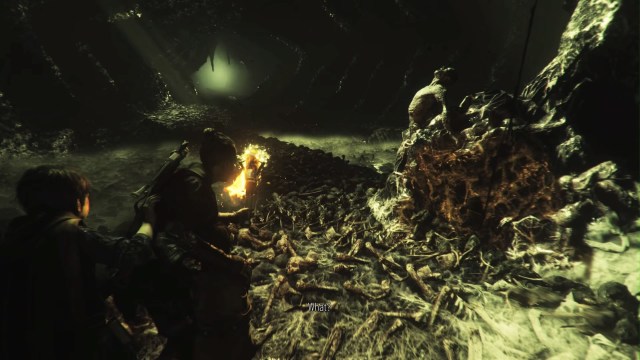A Plague Tale: Requiem is the highly anticipated sequel to Asobo Studio’s A Plague Tale Innocence. The story follows Hugo and Amicia de Rune, children of a royal French family, who are plunged into a life-or-death struggle when they are pursued by the ruthless Inquisition, seeking to kidnap the sickly Hugo. Innocence took the world of gaming by storm in 2019 due to its compelling narrative and puzzle-oriented, stealth gameplay. While this review will not contain any spoilers for A Plague Tale: Requiem, be warned as major spoilers for Innocence will be revealed.
Return of the King

When we last left our heroes Amicia and Hugo, the duo and their fellow orphan allies had narrowly escaped the Inquisition and defeated the Grand Inquisitor Vitalis Benevent in an epic final showdown. A Plague Tale: Requiem picks up many months later with Amicia, Hugo, their mother Beatrice, and the young alchemist Lucas living a peaceful existence on the road away from the mires of war and plague. The tranquility can’t last forever as Hugo’s Macula-cursed blood, which allows him to control swarms of plague rats with his mind, and Amicia’s violent defenses of her younger brother, consistently bring the siblings into conflict with the many unsavory figures they encounter in their travels. Requiem centers around the companions searching for an island Hugo has explored in a recurring dream, hoping to cure the Prima Macula.
While Innocence demonstrated a black-and-white morality regarding the game’s heroes and villains, Requiem sees its world in shades of gray with a number of new, complex characters encountered in the group’s travels. Amicia and Hugo also display growth as characters, as the former royals are no longer the sheltered children of the first game. The slingshot savant, Amicia, develops into a bonafide killing machine. And Hugo, no longer a sickly, fearful child, is quick to unleash his rage upon those who threaten him and his loved ones in a tidal wave of scurrying plague rats.
A Plague Tale: Evolution

From the moment that you enter the world of A Plague Tale: Requiem, it becomes exceedingly clear Asobo Studio went all out to make a worthy sequel. There are expansive levels to explore with some of the most gorgeous graphics that can be found in this generation of gaming, jaw-dropping set pieces, intricate puzzles, powerful new weapons, an improved control scheme, and a number of new features. Requiem introduces difficulty settings, new game plus, and ultimately a much longer, more substantial experience than its predecessor. While Innocence focused on smaller, linear stealth sections, Requiem is more of a sandbox allowing players to be as confrontational or as stealthy as they like. Based upon your gameplay style you can level up certain abilities with stealthier players improving their Prudence, and more violent players increasing their Aggressiveness stats.
Also, A Plague Tale: Requiem presents a duality in its environment. While Innocence by and large featured gloomy, rat-infested, plague-riddled locations, the sequel provides beautiful landscapes untouched by sickness, vibrant cities filled with optimistic civilians, and even ship and beachside environments. However, Requiem doesn’t sacrifice the terror of hordes of rats and ruthless enemies, as there are still plenty of the series’ trademark shadowy, cavernous sections to explore. Through Asobo’s use of varied environments in the sequel, there is a symbiotic enhancement as the dark environments feel scarier, and the sun-soaked cities feel even more welcoming and safe.
Related: Potionomics Review | Haggling Heroine
The Many Genres of A Plague Tale: Requiem

A Plague Tale: Requiem is even more difficult to classify than its predecessor, as the sequel ratchets up every genre that could be found in A Plague Tale: Innocence. While Requiem is first and foremost a stealth game through its most prominent gameplay mechanics, it also strongly fits into the horror subcategory as well through its increasingly terrifying visuals, tense atmosphere, and spooky environments. Similarly to the first entry, it’s also a puzzle game, with each level requiring patient ponderance in order to navigate hordes of rats, sneak past enemies, reach inaccessible locations, or simply discover how to progress. Asobo Studio has also increased the action-adventure elements of its new sequel, with a number of set pieces that compete with legendary series such as Uncharted. These scripted combat sequences morph A Plague Tale: Requiem into a third-person shooter. Despite Requiem feeling like a departure from Innocence in its much broader gameplay influences, the blend of genres is highly impressive.
Related: Halloween Horror Preview – The Most Anticipated Upcoming Horror Games
The Music of Requiem

The exquisite musical score by veteran videogame composer Olivier Deriviere deserves its own section for discussion. Following his masterful work on A Plague Tale: Innocence, A Plague Tale Requiem has an ambitious soundtrack to match its increasingly complex world. The dissonant orchestral songs and haunting choral harmonies blend seamlessly with the game’s ambiance. Deriviere’s compositions are integral to bringing the world of A Plague Tale: Requiem to life, and the game, as well as the series in general, would not be the same without his monumental contributions.
Of Rats and Men

While A Plague Tale: Requiem surpasses the previous title in virtually every possible aspect, the story does not quite meet the standard set by A Plague Tale: Innocence. While Innocence featured a compact plot with clear-cut goals, a compelling mystery, and urgency, Requiem, unfortunately, lacks these elements for large sections of its story. Requiem is far more ambitious in its scope and world-building, but after a sensational opening chapter, the early sections contain unfocused storytelling replete with plot threads that lead nowhere, fetch quests that aren’t vital to the story, and an overarching goal that increasingly feels like a wild goose chase. Thankfully, the fantastic gameplay is able to hide these flaws until the story picks up in the game’s later chapters, which are teeming with exciting twists and turns.
To Asobo Studio’s credit, A Plague Tale: Requiem thoughtfully explores the mental toll of Amicia’s violence and provides somewhat of a social commentary on when killing is acceptable vs. when it is cold-blooded murder. Lastly, in a modern media landscape that all too often focuses on profitability and branding over artistry, the bold, controversial choices made by Asobo Studio in A Plague Tale: Requiem is a breath of fresh air, and will surely be remembered by gamers long after the credits roll.
Pros and Cons
- Pros:
- Ambitious Sequel
- Gorgeous Graphics
- Nuanced Characters
- Improved Gameplay
- Massive Scope
- New Features
- Longer than the previous game
- Interesting Blend of Genres
- Epic Set Pieces
- Varied Environments
- Olivier Deriviere’s Excellent Score
- Scarier than A Plague Tale: Innocence
- Bold Plot Choices
- Thoughtful Social Commentary
- Great Acting Performances
- Cons:
- Storytelling Flaws
- You have to play A Plague Tale: Innocence first
Verdict

For fans of A Plague Tale: Innocence, A Plague Tale: Requiem is unquestionably a game worthy of your time and money. However, without experiencing the first game in the series, the story of A Plague Tale: Requiem will be extremely confusing, hindering your enjoyment, despite the captivating gameplay. Essentially, getting the most out of Requiem requires a playthrough of Innocence first.
Ultimately, do not be surprised if Asobo Studio’s newest entry into the A Plague Tale series gets some “game of the year” buzz as the awards season approaches. While it may not quite stack up against some of the elite game of the year contenders in 2022, A Plague Tale: Requiem is, for the most part, a textbook example of how a videogame sequel should be made.
Score: 9
A copy of this game was provided by the publisher for review. Reviewed on PS5.





Published: Oct 17, 2022 02:00 pm